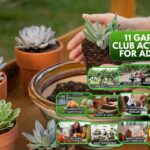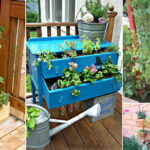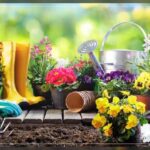Gardening is more than just a relaxing pastime; it is a profound act of defiance against the stark urban landscape that surrounds many of us. For those yearning for a connection with nature, beginning your own garden can seem daunting. However, a small plot of land or a few containers can serve as a portal to both personal fulfillment and environmental stewardship. What follows is a comprehensive guide for beginners contemplating their first garden adventure.
Many aspiring gardeners ponder, “What should I grow?” The answer often lies in the thrilling confluence of tastes, ease of cultivation, and the satisfaction derived from nurturing life. This article aims to explore a variety of plants that not only suit the interests of novice gardeners but also resonate with the younger demographic’s inclination towards sustainable living and health-oriented choices.
The first step toward a thriving garden is understanding its purpose. This allows for a deliberate choice in which to grow. Will it be a food garden, a floral haven, or perhaps a medicinal herb sanctuary? Once you establish your gardening goals, the choice of plants becomes an exciting and fulfilling endeavor.
While contemplating your garden, it’s essential to take into account your climate zone, available space, and time commitment. A little research goes a long way in ensuring your plants’ health and your gardening success. Now, let’s delve into some engaging options that promise fruitful endeavors for beginning gardeners.
Creating Your Vegetable Oasis
Growing vegetables is a straightforward and immensely rewarding choice for beginners. Not only does it provide fresh produce, but it also cuts down on grocery costs—an appealing factor for a younger audience.
Popular Vegetables for New Gardeners
When choosing vegetables, consider a selection that is both forgiving and fruitful. Leafy greens, such as lettuce and spinach, germinate rapidly and can yield multiple harvests throughout the growing season. These crops are excellent for beginners as they require minimal effort and deliver a satisfying return.
Tomatoes, often seen as the quintessential garden plant, are also remarkably forgiving, provided they receive ample sunlight and regular watering. The joy of plucking a sun-ripened tomato is unparalleled and can create a sense of accomplishment that invigorates young gardeners.
Additionally, root vegetables such as radishes and carrots are perfect for those who wish to experiment with different textures and flavors in their meals. They are easy to sow and can thrive in diverse conditions, making them ideal for novice cultivation.
Embracing the Floral Wonderland
For those who are less inclined toward the practicalities of a vegetable patch, creating a stunning flower garden can provide visual pleasure and attract pollinators, thereby enhancing the biodiversity of the local ecosystem.
Beginner-Friendly Flowers to Brighten Your Space
Marigolds and zinnias are fantastic choices for new gardeners, known for their vibrant hues and ease of care. These flowers not only add a splash of color to your garden but also serve to repel pests naturally, providing an ecological benefit alongside aesthetic appeal.
Sunflowers, with their towering stature and cheerful disposition, are another excellent option. They are relatively low-maintenance and can act as a charming centerpiece in any garden, capturing the hearts of people of all ages. Additionally, their seeds can be harvested for a nutritious snack.
Fragrant flowers such as lavender can provide sensory delight and have the added benefit of attracting beneficial insects. Their aromatic quality may be particularly appealing to younger audiences seeking to create a multisensory experience in their gardening endeavors.
Crafting a Medicinal Herb Haven
Herb gardening introduces yet another layer of creativity and utility. Young gardeners may be particularly intrigued by the idea of growing their own medicinal herbs, thus fostering a deeper understanding of herbalism and natural remedies.
Essential Herbs for Beginners
Herbs such as basil, mint, and rosemary are excellent choices to start your herbal journey. Basil, with its culinary versatility, is a staple in many kitchens and thrives with minimal care. It grows well in pots, making it suitable for those with limited space.
Mint, on the other hand, is known for its rapid growth, making it an excellent option for novice gardeners looking for instant gratification. However, it’s wise to contain mint, as it can easily overtake other plants if left unchecked.
Rosemary’s robust aroma and resilience make it another great addition, as it not only enhances dishes but can also be used in natural remedies. Understanding basic herbal growth can ignite a passion for natural healing—a philosophy that resonates with younger, health-conscious populations.
Tools of the Trade: Essential Gardening Equipment for Beginners
A successful gardening experience does not require excessive complexity in tools. However, having a few essential implements can facilitate the growth process significantly.
Begin with fundamental items such as gloves, a trowel, and a watering can. Gloves protect your hands from debris and thorns, while a trowel assists in soil preparation. A sturdy watering can or hose will ensure your plants receive optimal moisture without overdoing it.
Don’t overlook the importance of soil quality. Investing in good-quality potting soil can make all the difference in establishing a healthy foundation for your plants. Additionally, familiarizing yourself with organic fertilizers can further promote plant vitality, aligning with the sustainable practices favored by discerning young gardeners.
Conclusion: The Joys of Cultivating Your Own Space
Starting a garden is a journey filled with learning, discovery, and growth—both of the flora and yourself. As you choose what to cultivate, remember that the options abound, and the choices you make can reflect your interests and sustainability goals.
Whether you nurture a vegetable patch, orchestrate a floral display, or engage in herbal cultivation, each selection offers unique experiences and rewards. Embrace the process, revel in the successes, and appreciate the lessons learned along the way. Your garden serves as a potent reminder of your role in the environment as you cultivate life, foster biodiversity, and contribute to the sustainable practices that define the future.








Leave a Comment